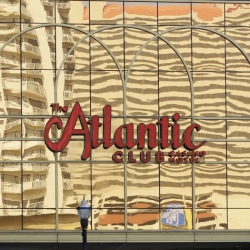
In an Ominous Sign, Moody’s Said This Week a State Relief Bill Might Not Be Enough to Save Atlantic City.
Mayor Don Guardian warned reporters on Wednesday that Atlantic City faces bankruptcy on April 29, 2016, if measures are not enacted to bolster the city’s finances. Atlantic City is famous as a casino gambling destination, but when the local gaming industry fell on hard times, the Boardwalk had its own financial collapse.
Now, Don Guardian says disaster is looming. He told an assembly of political leaders and reporters gathered at the New Jersey State League of Municipalities Conference, “Cash flow runs out April 29.”
Chris Christie Vetoes Relief Bill
The statement appears to be in response to a recent Chris Christie veto of relief legislation which was passed in the New Jersey legislature. Atlantic City faces a $101 million deficit this year, so lawmakers passed a bill which would have directed additional casino gaming revenues into the Atlantic City budget.
When he vetoed the bill, Gov. Christie requested changes be made to the bill which would give the state additional power over the funds being offered. Lawmakers have until January 12 to make those requested changes, or else the bill will have to go through the State Senate and the State Assembly once again. If that happens, then any legislative relief efforts might come dangerously close to the April 29 deadline.
Atlantic City’s $101 Million Budget Shortball
The measures are an attempt to shore up Atlantic City’s finances, after it was declared by several financial publications as the US city with the worst financial outlook in 2014.
When 2015 opened, Atlantic City had a $70 million budget shortfall, requiring New Jersey to loan the city $40 million, because its credit rating was so low. Strings came attached to that loan, as Gov. Christie appointed a pair of overseers to help direct Atlantic City’s economic turnaround. That did not seem to work, because the shortfall now has ballooned to $101 million.
The Decline and Fall of Atlantic City
It was not that long ago that Atlantic City seemed to be on top. From 1978 until 2006, Atlantic City embraced the casino economy. At a point in the mid-1980s, AC business and political leaders could claim they might one day challenge Las Vegas for casino supremacy. But that was when land-based gambling was confined to two states: Nevada and New Jersey.
Starting in 1989, the number of US states which allow brick-and-mortar gaming facilities has grown to over 40. Much of that growth came from Native American casinos, which won the right to exist in a landmark 1986 Supreme Court decision. As hundreds of Indian casinos sprang up across the United States, many state leaders saw no reason to ban private casino operations. To boost failing racetracks for horse racing and dog racing, lawmakers in some states allowed casino-style gaming at racing venues, creating the so-called racinos. The nationwide obsession with lottery gaming also chipped away at the anti-gambling stance states traditionally had taken.
Revenues Halved in Less Than a Decade
2006 was a peak year for Atlantic City. Revenues topped $5.4 billion. That was only two years after Pennsylvania had instituted its racino law. Soon, tens of thousands of Pennsylvanians were staying home to gamble at the racetracks, making Pennsylvania the US state with the second-highest gaming revenues. The rise of Pennsylvania meant the decline of Atlantic City, because its prosperity was buoyed by gamblers from Pennsylvania and New York.
The global recession hit at the same time Pennsylvania was making inroads. The American middle class had less disposable income to gamble away at casinos, while the high rollers were hoarding their cash. Then Hurricane Katrina hit, hurting the pocketbooks of New Jersey residents and the state treasury, as well. A series of factors combined to harm the Atlantic City economy.
2014 Casino Closings
In 2014, four of Atlantic City’s twelve casinos closed their doors. A fifth casino declared bankruptcy was saved from closing at the 11th hour by Carl Icahn. Gaming revenues had dwindled from $5.4 billion to $2.86 billion. In 2015, the numbers would dwindle even more, to an estimated $2.4 billion.
Economic Meltdown: No Tax Base
Not only were the direct tax revenues less for Atlantic City, but the closing of the casinos led to a jobs crisis. In 2014, Atlantic City lost 9,000 jobs, with 8,000 of the jobs lost coming from the casino gaming sector. In a city of only 40,000 residents, losing 9000 jobs is an absolute disaster. Hardly any local families are unaffected in such circumstances, while the city’s tax base craters.
Thus, Atlantic City faces insolvency and bankruptcy. Even worse, there is no obvious way out of the economic crunch. Moody’s Investors Service has downgraded AC’s debt to CAA1, seven steps below the standard investment rate. If the city issued bonds to raise cash, those bonds would be rated as “junk”.
Don Guardian summed it up when he said, “It would be foolish to bond at the rates we would have to. If we could find anyone to take our bonds.“
